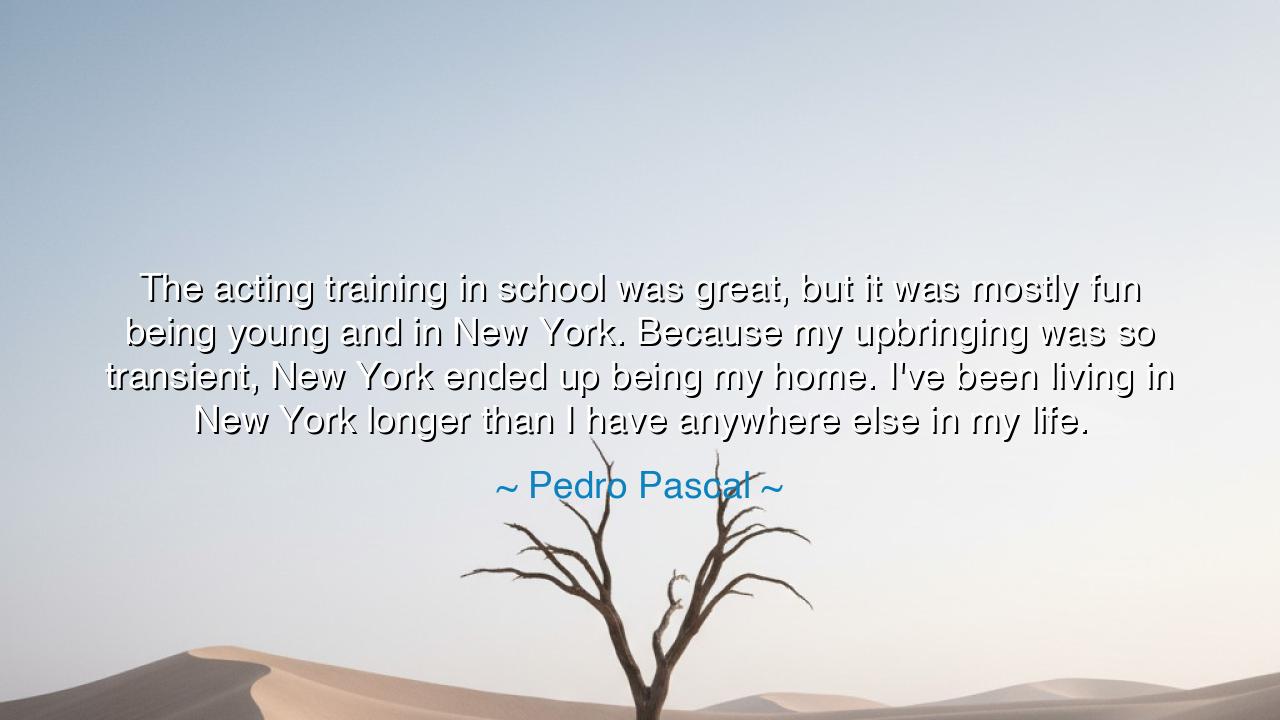
The acting training in school was great, but it was mostly fun
The acting training in school was great, but it was mostly fun being young and in New York. Because my upbringing was so transient, New York ended up being my home. I've been living in New York longer than I have anywhere else in my life.






In the candid remembrance of Pedro Pascal—“The acting training in school was great, but it was mostly fun being young and in New York. Because my upbringing was so transient, New York ended up being my home. I’ve been living in New York longer than I have anywhere else in my life.”—we hear the old story of a wanderer who finds a harbor that teaches him his own name. Technique honed the blade, yes, but the city gave it a purpose to cut toward. The line separates schooling from formation: acting training shapes the craft, while a chosen home shapes the soul that wields it.
To call an upbringing transient is to confess a life stitched from departures—boxes, new keys, fresh maps. The heart learns caution; belongings become light. Then a place arrives that refuses to be a stopover. New York, with its ceaseless tide of voices, becomes not noise but chorus. The wanderer discovers that being young in a city of a thousand doors is not merely diversion—it's apprenticeship to possibility. Streets serve as classrooms, subways as rehearsal halls, dusk-lit rooftops as sanctuaries where a person bargains with doubt and comes away with courage.
There is ancient wisdom in this: a home is not always inherited; sometimes it is elected. The Greeks had two words for place—soil that bore you and soil you swear allegiance to. Pascal’s sentence honors the second. He did not return to a cradle; he built a lighthouse. For one raised in motion, longevity itself is sacrament; “longer than anywhere else” is a vow spoken in years. The city does not soften; it steadies. It says, “Stay long enough and I will mirror you back to yourself—flaws, fire, and all.”
Consider Alexander Hamilton, born far from Manhattan’s granite spine, ferried by necessity and hunger. In New York he found a forge: young, unestablished, he took in the city’s furious grammar—presses clacking, docks heaving, councils arguing—and translated it into destiny. King’s College gave him training; the streets gave him cadence. Like Pascal, he lived here “longer than anywhere,” and in doing so turned borrowed ground into belonging. The island did not erase his transient origins; it transmuted them into drive.
So too for legions through Ellis Island: tailors who became designers, busboys who became poets, children who learned to name the constellations between tenements. The lesson is persistent—New York is both anvil and embrace. It is a city that allows a stranger to arrive with only verbs—work, learn, try—and leave with nouns—home, neighborhood, tribe. Under its neon, the restless discover that permanence can grow from practice: the daily returning to the same corner café, the same theater door, the same skyline stitching courage into morning.
What, then, is the teaching for those who are still unmoored? Do not confuse training with home. Seek mentors and methods, yes, but also seek a geography that enlarges you. Choose a city (or a town) whose pace harmonizes with your pulse. Stay long enough to learn its seasons, serve its people, and let it edit your rough edges. Make ritual the mortar of belonging: a weekly walk, a library card worn thin, a stage—literal or figurative—where your voice learns to stand without apology.
Practical actions follow. (1) Name your three non-negotiables for a home—the kind of work you can do there, the kind of community you can join, the kind of awe you can access on foot. (2) Trade breadth for depth: rather than sampling ten cities, root in one; measure success by the relationships that recognize your absence. (3) Pair acting training (or any craft) with civic practice: volunteer, show up for readings, mentor the newer arrivals—in giving shape to others, your own shape clarifies. (4) Keep a “Belonging Ledger”: each month, record one street, one face, one door that now feels like yours; watch the list turn into a map.
At last, carry Pascal’s witness like a compass: the head can choose a school; the heart must choose a place. If your path has been transient, let that history make you generous, not rootless. And if a city—be it New York or another—answers your ache with its own stubborn light, honor it with time, with work, with love. For the longest tenure we hold anywhere often becomes the clearest mirror of who we are becoming—and in that mirror, a stranger learns at last to greet himself as citizen, neighbor, and at peace: at home.






AAdministratorAdministrator
Welcome, honored guests. Please leave a comment, we will respond soon